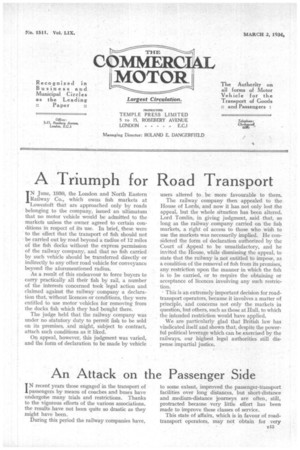A Triumph for Road Transport
Page 27

If you've noticed an error in this article please click here to report it so we can fix it.
IN June, 1930, the London and North Eastern Railway Co., which owns fish markets at Lowestoft that are approached only by roads belonging to the company, issued an ultimatum that no motor vehicle would be admitted to the markets unless the owner agreed to certain conditions in respect of its use. In brief, these were to the effect that the transport of fish should not be carried out by road beyond a radius of 12 miles of the fish docks without the express permission of the railway company, and that no fish carried by such vehicle should be transferred directly or indirectly to any other road vehicle for conveyance beyond the aforementioned radius.
As a result of this endeavour to force buyers to carry practically all their fish by rail, a number of the interests concerned took legal action and claimed against the railway company a declaration that, without licences or conditions, they were entitled to use motor vehicles for removing from the docks fish which they had bought there.
The judge held that the railway company was under no statutory duty to permit fish to be sold on its premises, and might, subject to contract, attach such conditions as it liked.
On appeal, however, this judgment was varied, and the form of declaration to be made by vehicle users altered to be more favourable to them.
The railway company then appealed to the House of Lords, and now it has not only lost the appeal, but the whole situation has been altered. Lord Tomlin, in giving judgment, said that, so long as the railway company carried on the fish markets, a right of access to those who wish to use the markets was necessarily implied. He considered the form of• declaration authorized by the Court of Appeal to be unsatisfactory, and he invited the House, while dismissing the appeal, to state that the railway is not entitled to impose, as a condition of the removal of fish from its premises, any restriction upon the manner in which the fish is to be carried, or to require the obtaining or acceptance of licences involving any such restriction.
This is an extremely important decision for roadtransport operators, because it involves a matter of principle, and concerns not only the markets in question, but others, such as those at Hull, to which• the intended restriction would have applied.
We are particularly glad that British law has vindicated itself and shown that, despite the powerful political leverage which can be exercised by the railways, our highest legal authorities still dispense impartial justice.




























































































